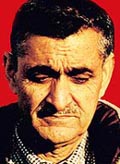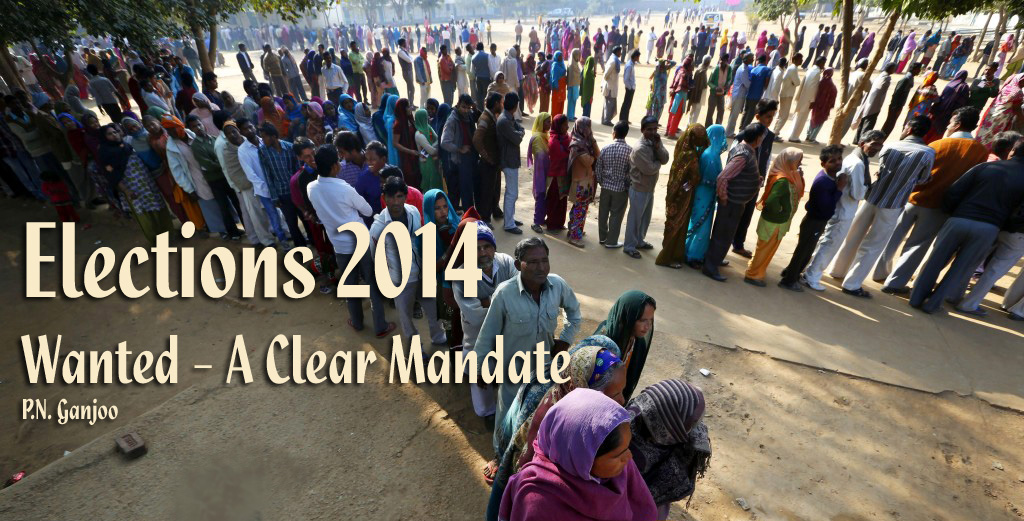Elections 2014 - Wanted, a Clear Mandate

|
|
|
| I have no intent to pontificate on the present political scenario in India. This is a modest effort to assess the political evolution of Indian parliamentary democracy during the last six decades. Simply by watching this evolution, one is amazed to believe that Indian voters continue self mortification by not returning a single party to rule either at the centre or in the states. It was only for first twenty years after Independence of India in 1947 that Indian voters returned a political party with a clear majority to run the government at the centre and even in the states, with accountability and stability. As a result of this positive political participation of the voters, an instrument of publicsensitive and transparent governance was created which was also answerable to the people. As a result there were fantastic achievements in all social and cultural sectorsof India. India achieved breakthroughs in agriculture production and established wide and deep industrial infrastructure. India was able to put in place an efficient network of social welfare projects for all sections of the population. All this lead to visible improvement in living conditions of people. However, with the march of time and rising aspirations and expectations of the people there arose a need to further improve the working of the democratic institutions of Panchayats, Municipalities, Assemblies and Parliament. Unfortunately the political parties and the voters messed with this core issue of our participatory democracy and instead of adopting a comprehensiveapproach topeople’sengagement in the democratic process of governance, they adopted a narrow and parochial attitude. Caste, creed, ethnic and religious considerations were allowed to guide and even control all our democratic institutions. So voice and choice of people for different issues was split not on the basis of rational and national requirements but only with a view to placate narrow and shallow interests of caste, class ,creed ethnic and religious considerations. National interests and demands were ignored causing set back to our fight against illiteracy, disease control, poverty and unemployment that in turn thwarted our social growth and cultural development. Much of time and efforts of people and politicians were wasted on petty internecine and inconsequential issues,ignoring the major problems that our country was facing. The initial post -1947 period of satisfaction, stability and growth was followed by a period of uncertainty, hesitation and split. Though voter turn out in the elections was rising, yet verdicts were split and indefinite giving no particular party the majority to rule with authority and conviction. Votes were not cast on the basis of policies and principles. They were cast on the consideration of caste, creed, ethnicity and religious considerations. Thus came into existence in Indian polity a period of broken mandate which made political parties lose accountability. At the national level political monopoly enjoyed by Congress was broken and the mandate of the people was split based on caste, class, creed and ethnicity. This split in the mandate morphed into antagonistic groups in the legislature at state and central levels. This lead to the phenomena of no majority for any party at national and even provincial level. With a scattered mandate it was not possible to cobble a public sensitive, stable democratic government for all the people. It was even harder to create long term plans as the coalitions of compulsions did not have a common agenda except to put forward and advance group and partisan interests. They had no common policies or even common minimum programs to address the burning problems of poverty, agriculturalstagnation, industrial stupor, educational backwardness, disease and health care, labour unrest, breakdown of law and order and maintenance of internal and external security. Such governments did not even encourage a national view on issues of national importance, like national security, international relations, trade, currency, foreign relations, fundamental rights of citizens and upholding of the constitution of India. Such lame duck governments lived to survive from crisis to crisis which weremany times created by their own partners. Such governments created a nexus of corrupt politicians, insensitive bureaucrats and police, criminals, trade and land mafia.Common people were ignored and forgotten and people lost faith and trust in the democratic system of governance. The middle class which is fairly large and the fasted growing segment of Indian society lost all faith and interest and therefore isolated itself from an active role in politics. So long as Indian voters do not shun their apathy, there is no hope to redeem ourselves from the miserable politics we have pushed ourselves into by our own acts of commission and omission. As the owner of the largest democracy in the world, India has to rectify itto participatory functioning. Indian voters have to learn to think properly, shun off their caste and class identity and learn to think in national terms for the overall good and benefit of society. One of the reasons for the steep fall in democratic standards in the country has been the absence of great visionary leaders in the political dispensation. We lack idealists. We have no dreamers. We lack giants. All the political parties have herded packs of mediocre politicians who lack political and moral stature and are adept to nurse their shallow and narrow caste and class interests which are at cross purposes ofwith a unified national approach. The apathetic rather the negative attitude of the vast pool of middle class voters of India has contributed in no small way to the malaisewhereby a vast majority of voters desist, rather abstain from the electoral process. This attitude of the middle class voters works as a positive affirmation of the negative policiesof politicians. Unless the middle class abandons itsapathy and starts active participation in the electoral process, little improvement can be hoped for. The civil society of India has started asserting itself and advocated for fixingof doddering governance. The mass public mobilization witnessed during 2010 for enactment of law on Lok Pal (Public Ombdasman) brought some success. Equally the gang rape of a woman on a moving bus in Delhi capital of India on 16th December 2012 ignited the people of the entire country to demand stringent laws against rape and for the protection of women in India. More ever other public accountability laws like RTI have been enacted on heavy public demand. Like is the case with RTE which ensures basic education for all children of 6 to 14 years of age and it is now a fundamental right. The law envisaging Right to Food for all citizens too is on the anvil, which when enacted will have far reaching implications and will ensure cheap food to the citizens of India. Equally law on employment guarantee in the country side is in place to ensure work to the unemployed. Citizens are now making governments more accountable and citizens can demand and get valuable information inputs which earlier used to be hidden under the cover of “official secrecy.” As a result various scams like 2G, Coalgate, Helicopter-gate and Railgate have come to light. All these scandals would not have bene revealed if RTI had not come to being. Such achievements need to be strengthened and stabilized through more public support and participation. That will indeed be the India that our forefathers dreamt of and we shall have to strive for. Let this middle class now act decisively and help bring in a government that has a clear mandate, which will help it to bring in real change for all round development of the nation. We can hold this elected government fully responsible on measurable performance parameters and elect the same or a different set of people the next time around. Let us remove the space for small, divisive, splinter groups to play the roles of power brokers and nuisance value agents.
|
| |
 *P.N.Ganjoo was born in a modest Kashmiri family about 7 decades ago, lost his father early and was raised by his honest, hardworking mother. With her efforts he received his education in Srinagar and went on to serve in various Government Departments before retiring as a senior grade KAS officer.
*P.N.Ganjoo was born in a modest Kashmiri family about 7 decades ago, lost his father early and was raised by his honest, hardworking mother. With her efforts he received his education in Srinagar and went on to serve in various Government Departments before retiring as a senior grade KAS officer.Presently he is working on his varied interests besides being a consulting Director of a software services company. |
| |
| Copyrights © 2007Shehjar online and KashmirGroup.com. Any content, including but not limited to text, software, music, sound, photographs, video, graphics or other material contained may not be modified, copied, reproduced, republished, uploaded, posted, or distributed in any form or context without written permission. Terms & Conditions. The views expressed are solely the author's and not necessarily the views of Shehjar or its owners. Content and posts from such authors are provided "AS IS", with no warranties, and confer no rights. The material and information provided iare for general information only and should not, in any respect, be relied on as professional advice. Neither Shehjar.kashmirgroup.com nor kashmirgroup.com represent or endorse the accuracy or reliability of any advice, opinion, statement, or other information displayed, uploaded, or distributed through the Service by any user, information provider or any other person or entity. You acknowledge that any reliance upon any such opinion, advice, statement, memorandum, or information shall be at your sole risk. |


